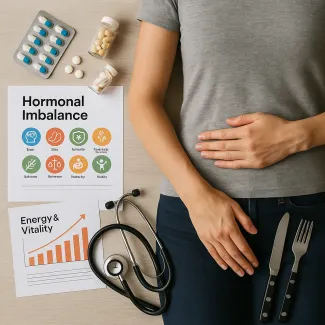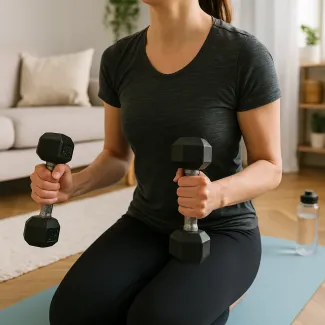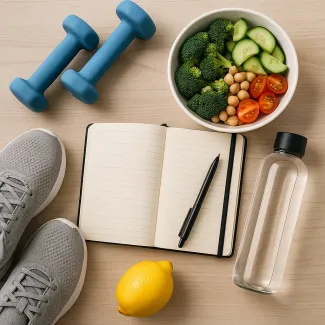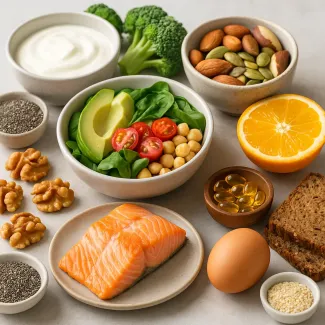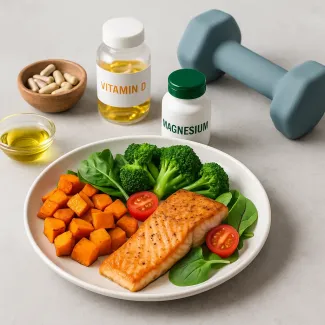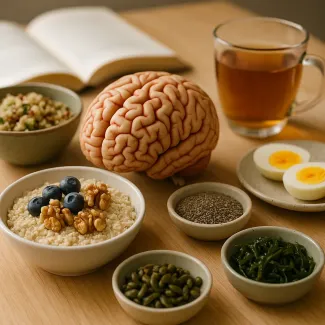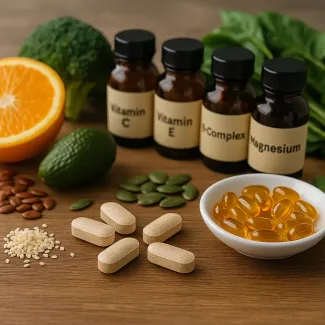
How nutrient balance transforms female health after 30
Discover the essential vitamins and minerals that support women’s energy, hormones, and vitality in their 30s and beyond
Why nutrient needs change after your 30s
Women experience significant biological and hormonal changes starting around their early 30s. While these changes are often subtle, they can affect everything from energy levels, skin elasticity, and immune response, to mental clarity, menstrual cycles, and bone density. As a result, the body’s nutrient demands evolve, requiring more targeted vitamin and mineral support.
Lifestyle, stress, pregnancy, and perimenopause further influence this shift. Women in their 30s may find that their diet no longer fully supports their body’s needs. A strategic intake of key micronutrients can help reduce fatigue, boost immunity, support mental health, and balance hormones naturally.
Key vitamins every woman should prioritize in her 30s
Vitamin D: More than just sunshine support
Often called the sunshine vitamin, vitamin D becomes even more critical after age 30 due to its essential role in bone health, immune support, and hormonal regulation. Many women are deficient in vitamin D, especially those living in northern climates or spending most time indoors.
Vitamin D helps maintain calcium absorption, reducing the risk of osteopenia and osteoporosis later in life. It also plays a role in mood regulation, and insufficient levels have been linked to depression and fatigue.
Best sources: Fatty fish (like salmon), egg yolks, fortified dairy, and moderate sun exposure.
Vitamin B12: Vital for energy and cognitive health
Vitamin B12 supports red blood cell formation, neurological function, and DNA synthesis. After 30, many women may develop absorption issues due to lower stomach acid production or digestive imbalances, making supplementation more relevant.
Low B12 can result in brain fog, fatigue, mood swings, and even memory issues.
Best sources: Animal proteins, nutritional yeast, fortified plant milks, and B12 supplements (especially in methylcobalamin form for better absorption).
Folate (Vitamin B9): Crucial for hormonal and reproductive health
Folate is best known for its role in pregnancy, but its benefits extend well beyond. It helps regulate homocysteine levels, supports mood balance, and is vital for cellular repair and ovarian function.
Unlike synthetic folic acid, natural folate (in the form of 5-MTHF) is easier to absorb and gentler on the body, especially for women with MTHFR gene variations.
Best sources: Leafy greens, legumes, citrus fruits, avocados, and fortified grains.
Vitamin C: Antioxidant powerhouse for skin and immunity
Vitamin C is essential for collagen production, helping maintain skin elasticity, wound healing, and immune system strength. It also protects cells from oxidative stress, a key factor in aging.
Women in their 30s benefit from increased vitamin C intake, especially during periods of stress, poor diet, or environmental exposure.
Best sources: Bell peppers, oranges, strawberries, kiwis, and broccoli.
Vitamin A: Vision, skin, and immune health ally
Vitamin A supports eye health, cell regeneration, and immune function. It also helps regulate the sebaceous glands, making it valuable for women experiencing adult acne or dry skin in their 30s.
Best sources: Carrots, sweet potatoes, spinach, liver, and dairy products.
Essential minerals to support your 30s and beyond
Iron: Guarding against fatigue and hormonal imbalance
Iron is essential for oxygen transport in the blood and energy production. Women in their 30s often experience iron deficiency, especially if they have heavy periods, are pregnant, or eat a predominantly plant-based diet.
Symptoms of low iron include chronic fatigue, pale skin, hair thinning, and irritability.
Best sources: Red meat, legumes, lentils, spinach, and iron-fortified cereals.
Magnesium: Stress management and muscle recovery
Magnesium supports over 300 biochemical processes in the body, including muscle function, nerve transmission, and blood sugar regulation. It’s particularly helpful for managing PMS, migraines, and sleep disturbances.
Stress depletes magnesium rapidly, making it a priority mineral for modern lifestyles.
Best sources: Pumpkin seeds, almonds, spinach, black beans, and dark chocolate.
Calcium: Building stronger bones before menopause
Women begin to lose bone density gradually in their 30s. Calcium is necessary to preserve bone strength and prevent osteoporosis as estrogen levels begin to fluctuate.
Pairing calcium with vitamin D and vitamin K2 improves absorption and bone deposition.
Best sources: Dairy, tofu, sardines (with bones), sesame seeds, and fortified drinks.
Zinc: Hormonal balance and immune resilience
Zinc plays a key role in reproductive health, thyroid function, wound healing, and immune defenses. A deficiency can result in hormonal acne, poor skin healing, low libido, and menstrual irregularities.
Best sources: Shellfish, red meat, pumpkin seeds, and whole grains.
Iodine: Essential for thyroid function
Iodine supports thyroid hormone production, which regulates metabolism, energy levels, and body temperature. Iodine deficiency is more common in women, especially those avoiding dairy and iodized salt.
Best sources: Seaweed, iodized salt, seafood, and eggs.
Targeted nutrient benefits for common concerns after 30
Fatigue and low energy
- Vitamin B12, iron, and magnesium are the most effective for combatting chronic tiredness.
- Combining iron with vitamin C enhances absorption and impact.
- Adding adaptogenic herbs like ashwagandha can complement these nutrients.
Skin health and premature aging
- Vitamin C and vitamin A are key for collagen production and cell renewal.
- Zinc and selenium help reduce inflammation and support skin healing.
Hormonal fluctuations and PMS
- Magnesium, vitamin B6, and zinc help reduce PMS symptoms, bloating, and mood swings.
- Omega-3 fatty acids (from supplements or fatty fish) assist in prostaglandin regulation, reducing cramps and inflammation.
Mental clarity and focus
- B-complex vitamins, especially B12, along with omega-3s, are known to improve cognitive function.
- Magnesium supports the nervous system and helps prevent overstimulation from stress.
Lifestyle habits that enhance nutrient absorption
Pair nutrients with the right foods
Some vitamins are fat-soluble (A, D, E, K) and require dietary fats for proper absorption. Consuming them with avocados, olive oil, or nuts enhances bioavailability.
Iron is better absorbed when taken with vitamin C-rich foods and away from coffee or tea, which contain compounds that inhibit absorption.
Reduce nutrient-depleting habits
- Smoking, alcohol, excess sugar, and chronic stress all increase the body’s demand for nutrients.
- Overexercising without replenishment can lead to magnesium and iron depletion.
Optimize your gut health
A healthy gut is essential for micronutrient uptake. Include fermented foods like sauerkraut, yogurt, and kefir, and consider a probiotic supplement.
Gut imbalances like SIBO or leaky gut can impair absorption of iron, B12, and fat-soluble vitamins.
Supplementing wisely in your 30s
Do you need a multivitamin?
For many women, a well-formulated women’s multivitamin provides insurance against dietary gaps. Choose one that contains methylated B vitamins, chelated minerals, and avoids excessive synthetic fillers.
Customize your supplements
If you have:
- Heavy menstrual bleeding: Focus on iron and vitamin C.
- Skin issues: Add zinc, vitamin A, and omega-3s.
- Thyroid symptoms: Ensure iodine, selenium, and zinc are covered.
- Digestive issues: Prioritize B12, magnesium, and probiotics.
Natural ways to improve nutrient intake
Eat the rainbow
A diet rich in colorful vegetables, whole grains, lean proteins, and healthy fats covers a wide range of nutrients. Prioritize seasonal, fresh, and minimally processed foods.
Prepare meals in nutrient-friendly ways
- Steam instead of boil to preserve vitamin C and B vitamins.
- Soak legumes and grains to reduce phytates, which inhibit mineral absorption.
- Add citrus or vinegar to iron-rich plant foods to improve uptake.
Support systems for long-term nutrient balance
Regular health check-ups
Monitor levels of vitamin D, B12, iron, and thyroid hormones at least once a year, especially if you're feeling low energy or experiencing symptoms of deficiency.
Smart meal planning
Batch cooking and meal prepping with nutrient-dense recipes helps ensure daily intake of key micronutrients without relying heavily on supplements.
Hormone-friendly practices
Adopt stress-reducing activities like yoga, meditation, and nature walks. High cortisol can suppress thyroid function and increase nutrient burn.
Get enough quality sleep
Sleep is when the body repairs, detoxifies, and absorbs nutrients. Aim for 7–9 hours per night and create a dark, cool, and technology-free environment.
Movement to boost circulation
Regular physical activity supports blood flow, enhances nutrient delivery, and reduces inflammation. Prioritize strength training, walking, and mobility routines over high-intensity exercise every day.
Special considerations for plant-based diets
Key nutrients to monitor
- Vitamin B12, iron, zinc, omega-3s, and iodine may be lower in plant-based diets.
- Choose fortified plant milks, nutritional yeast, seaweed, and algal oil supplements.
Pairing for better absorption
- Pair iron-rich lentils with lemon or bell peppers.
- Avoid coffee or tea near meals for better iron and zinc uptake.
- Include fermented foods to enhance digestive health and absorption.
Nutrient myths to ignore after 30
“If I eat healthy, I don’t need supplements”
Even a healthy diet may not provide enough magnesium, vitamin D, or B12, especially due to modern farming practices, stress, and digestive health.
“Only pregnant women need folate”
Folate is essential for DNA repair, ovarian function, and detox pathways, even outside of pregnancy. It supports long-term hormonal and metabolic health.
“Calcium is only for old age”
Bone mass peaks in your 30s. Failing to get enough calcium now sets the stage for osteoporosis and fractures later in life.
“More is better”
Megadosing vitamins can disrupt absorption of others or even become toxic. Balance and bioavailability matter more than quantity.
Lab testing and personalized tracking
Suggested panels for women in their 30s
- Vitamin D 25(OH)D
- Serum Ferritin (iron stores)
- Serum B12 & MMA
- Magnesium RBC
- Thyroid panel (TSH, FT3, FT4, antibodies)
These help personalize your nutritional support based on current needs, avoiding over- or under-supplementation.
How to track progress
Use a health journal or tracking app to note energy, mood, skin, digestion, and cycle patterns. Over time, these metrics reflect how well your nutrient strategy is working.
